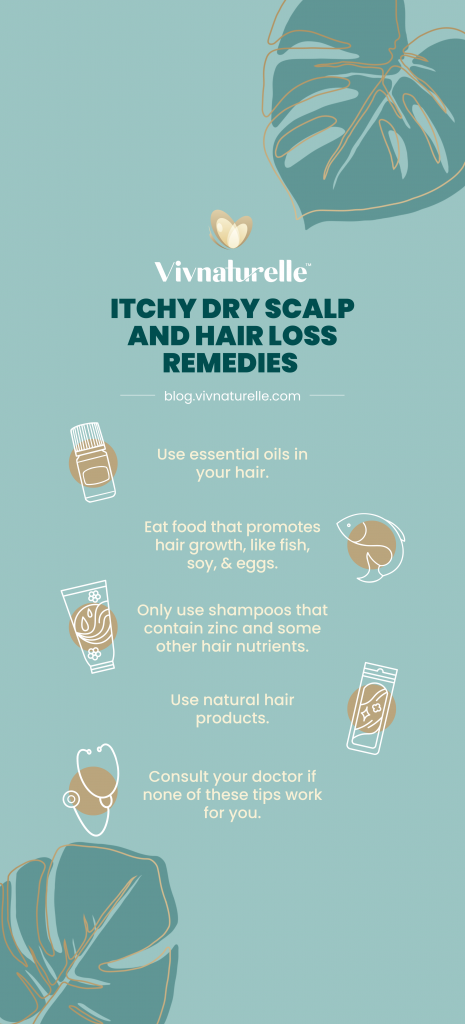Itchy dry scalp and hair loss are not something new. This is an experience many people go through in life. Naturally, human hair grows with or without any form of treatment. All the care and treatment we give to the hair is to better manage the growth without issues. When the hair has problems like dry scalp and hair loss, it is often nothing to worry about. There are several preventive and curative measures available to help restore beauty and glow to the hair.
Experts have linked itchy scalp or scalp pruritus to many causes. Some of these cases take a long time to develop, while others occur almost immediately. For instance, reactions to certain hair products can cause itching on the scalp and further hair loss. In certain cases it could be a fungal infection or allergy that can trigger hair loss. Other times, it can be hereditary. Now let us dig further into the main causes of itchy dry scalp and hair loss.

Causes of itchy dry scalp and hair loss
There are several factors that can cause itchy dry scalps in humans. For instance, you can damage the hair follicles and skin by intense or repeated scratching. This damage can trigger bleeding, scabbing and hair loss. This is only temporal since the hair grows back once the scalp heals. Temporary hair loss is not much of a concern. Let us look at the severe cases.
Dandruff
Dandruff is one of the common causes of hair loss. It causes an itchy dry scalp which brings out flakes during scratching. You can notice dandruff flakes immediately after brushing or combing the hair. Hair loss because of dandruff can be temporary or permanent. If dandruff is left untreated for a long time, hair loss will happen. Over-the-counter remedies for dandruff are plentiful. You can check out some unique natural hair products that can combat dandruff. You can apply some home remedies like natural oil, especially before shampooing. It helps with dead skin exfoliation from the scalp.
Scalp Ringworm
A ringworm is a fungual infection that causes an itchy red rash that appears on the head in the shape of a ring. It is more obvious on the scalp when on low-cut hair. Moreover, ringworm is among the fungal infections that cause hair loss and it causes hair loss by weakening the hair follicles.
A person can easily spot ringworms with distinct red patches on the scalp. According to experts , there are some OTC (over-the-counter) antifungal creams are available to treat ringworm and after completing the treatment, the hair will grow back.
Allergic reactions
Itch dry scalp and hair loss can be caused by allergic reaction to ceratin hair products. In some cases, this can cause scalp and hair follicle irritation, thus causing regular itching. However, this kind of reaction is usually mild. In severe cases, scalp irritation will cause remarkable hair loss, so it is important to test hair products for allergies before using them.
Additionally, you can always use vegan hair products which contain only natural ingredients and they are least likely to cause irritations. Some of the hair products people react to include shampoos, conditioners, dyes, gels, and others.
One of the common ingredients that cause allergies is paraphenylenediamine, as studied in an article published in the Archives of Medical Science and It is a common ingredient in dark hair dyes. It is important to remember, that if a product causes an allergic reaction, to stop using it and change it to a different one.
Psoriasis
Moreover, itchy dry scalp and hair loss can be caused by psoriasis. According to experts, psoriasis is an autoimmune condition which causes dry scalp with red patches. It also has a silvery scale covering which covers the hair follicles and prevents hair growth. Also, scratching the psoriasis scabs can cause serious hair loss as the scabs fall off the scalp. If you have psoriasis, a dermatologist will be able to help you develop a treatment and manage the psoriasis.
Folliculitis
Moving on to other causes of itchy dry scalp and hair loss, we find folliculitis. Scientists say that this is simply the inflammation of human hair follicles. Some bacterial and fungal infections are responsible for this. This ailment causes temporary hair loss. It is important to be noted that, this can easily be treated using prescribed antibiotics. You must visit your local doctor if you ever notice this in your hair in order to treat it on time and reduce itching.
Lichen planopilaris
In regards to other causes of itchy dry scalp and hair loss, we found lichen planopilaris. This is a condition that generates inflamation to the scalp and experts consider it as a result of an exhausted immune system. This condition can create itch, flaky skin and hair loss.
Alopecia areata
In addition, another explanation for itchy dry scalp and hair loss is alopecia areata. Professionals don’t really know why alopecia areata happens, but they believe that it evolves because a person’s immune system, assaults by accident hair follicles.
This is a severe case where hair patches fall out from the head and it is often itchy. It is more common in people who have autoimmune conditions or a family history. Immunotherapy, steroids, and some antifungal ointments help treat this condition. In severe cases, a hair transplant may be necessary to regain hair that has been lost.
Atopic Dermatitis
Furthermore, according to specialists, atopic dermatitis (atopic eczema), is a chronic relapsing inflammatory skin condition. Even though it isn’t directly linked to hair loss, it can generate enormous scratching, which can later lead to temporary hair loss. Also, people can deal with atopic dermatitis by using creams and lotions.
Home remedies for treating itchy dry scalp and hair loss
Here are some natural remedies to help you combat dry scalp and hair loss.
- Use essential oils for your hair. You can learn more about essential oils here.
- Intentionally eat food that promotes hair growth, such as fish, soy, eggs, and others.
- Use only shampoos that contain zinc and some other hair nutrients.
- Use natural hair products, you can find amazing ones here.
- Consult your doctor if none of these work for you.
Remember to always pamper and nourish your hair.
Prevention
Below you can find some methods to prevent hair loss:
- Refrain from excessive scratching
- Use gentle shampoos
- Massage the scalp in order to trigger blood flow to hair follicles
- Have a balance diet.



